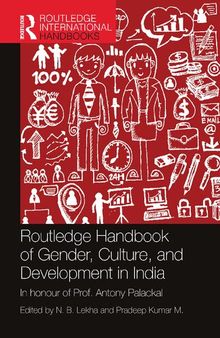 جزییات کتاب
جزییات کتاب
Lekha, Kumar M., and their team of contributors embark on a transformative exploration of 'Intersectionality' in the Indian context, where gender, culture, and development intersect to shape the destinies of diverse groups. Drawing from extensive research and nuanced analyses by scholars across the country and a few scholars on India from outside the country, the handbook uncovers the intricate connections between gender inequalities, cultural norms and practices, and developmental trajectories that illuminate how these factors intersect and shape the lives of individuals, communities, and societies beyond India's borders.The book encompasses discussions on the category of gender and the practice of gender studies, workspace economy, and technology. It explains the intricate intersections between gender, labour, migration, and informal economies, offering a deeper understanding of the composite factors that shape women as the workforce and their role within the workplace and the economy. It also delves into the multifaceted influences of culture on various aspects of society, including gender roles, language, agriculture, and development. The focus upon the sociocultural dimensions connected to the portrayal of gender in the media elaborated on how diverse media platforms, ranging from digital interfaces to televised serials, play a pivotal role in shaping and mirroring gender identities, roles, and societal norms within their specific environments. Most importantly, it critically engages with issues of education, marginalization, inclusion, and sustainable development. Case studies on marginalized communities such as the urban poor, elderly sweepers, and widows contribute to broader discourses on developmental paradigms vis-à-vis poverty and social exclusion.Academics, researchers, and students interested in gender, culture, and development studies will find this handbook invaluable in understanding and addressing gender inequities, cultural imbalances, and development complexities. Policymakers, NGOs, and activists committed to social progress will appreciate the evidence-based insights enabling them for informed actions and policies that transcend conventional boundaries.



 دانلود کتاب
دانلود کتاب

 جزییات کتاب
جزییات کتاب





 این کتاب رو مطالعه کردید؟ نظر شما چیست؟
این کتاب رو مطالعه کردید؟ نظر شما چیست؟
